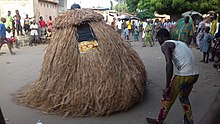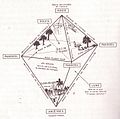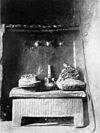Portal:Traditional African religions
Introduction The beliefs and practices of African people are highly diverse, including various ethnic religions. Generally, these traditions are oral rather than scriptural and are passed down from one generation to another through folk tales, songs, and festivals, and include beliefs in spirits and higher and lower gods, sometimes including a supreme being, as well as the veneration of the dead, and use of magic and traditional African medicine. Most religions can be described as animistic with various polytheistic and pantheistic aspects. The role of humanity is generally seen as one of harmonizing nature with the supernatural. In the past, African religion used to be referred to as 'traditional' but this is no longer appropriate. 'Traditional' was used to distinguish Africa religion from Abrahamic religion which came to the continent as a result of proselytism. Colonialism supported the false view that Africa had no religion. (Full article...) Selected articleAfrican art describes the modern and historical paintings, sculptures, installations, and other visual culture from native or indigenous Africans and the African continent. The definition may also include the art of the native African, African diasporas, such as African American, Caribbean and other American art. Despite this diversity, there are some unifying artistic themes when considering the totality of the visual culture from the continent of Africa. Traditional African religions have been extremely influential on African art forms across the continent. African art often stems from the themes of religious symbolism, functionalism and utilitarianism, and many pieces of art are created for spiritual rather than purely creative purposes. Many African cultures emphasize the importance of ancestors as intermediaries between the living, the gods, and the supreme creator, and art is seen as a way to contact these spirits of ancestors. Art may also be used to depict gods, and is valued for its functional purposes. Selected imagesFestivalsThere are several religious festivals found in the various Traditional African religions. Some of these are listed below next to their corresponding religion :
Selected biography
Soumaoro Kanté (var.: Sumanguru Kanté) was a 13th-century king of the Sosso people. Seizing Koumbi Saleh, the capital of the recently defunct Ghana Empire, Soumaoro Kanté proceeded to conquer several neighboring states, including the Mandinka people in what is now Mali. However, the Mandinka prince Sundiata Keita built a coalition of smaller kingdoms to oppose him at the Battle of Kirina (c. 1235), defeating the Sosso and leaving Sundiata's new Mali Empire dominant in the region.
Soumaoro Kanté is portrayed as a villainous sorcerer-king in the national epic of Mali, the Epic of Sundiata. Selected quote
Source: Diouf, Babacar Sédikh, Le Sérère, Paganism Polythéiste ou Religion Monothéiste [in] Camara, Fatou Kiné (PhD) & Seck, Abdourahmane (PhD), "Secularity and Freedom of Religion in Senegal: Between a Constitutional Rock and a Hard Reality", p 860-61 (PDF - p. 2-3) [1]
Did you know
Related portalsTopicsFor more Traditional African religion topics, see Category:Traditional African religions.
CategoriesWikiProjectsThings you can doAssociated WikimediaThe following Wikimedia Foundation sister projects provide more on this subject:
Discover Wikipedia using portals |






































